Weak social ties linked to higher risk of recurrence, early death, researchers say
MONDAY, Dec. 12, 2016 (HealthDay News) — Social isolation may impede long-term breast cancer survival, according to a study published online Dec. 12 in Cancer.
Researchers looked at a woman’s social connections in the two years after her breast cancer diagnosis to see how having friends, a spouse, relatives, or community ties might affect her survival. Data were collected on 9,267 women. Over an average follow-up of 11 years, 1,448 cancers returned. Also, 1,521 women died, 990 from breast cancer, the researchers found.
The team linked isolation with a higher risk of cancer recurrence compared to socially connected women (hazard ratio, 1.43). These solitary women also had an increased risk of breast cancer mortality and all-cause mortality (hazard ratios, 1.64 and 1.69, respectively). The links between social connections and prognosis were strongest among women with earlier-stage cancer, and specific associations differed by age, race, ethnicity, and country. For example, ties to relatives and friends predicted lower breast cancer mortality for nonwhite women. Marriage predicted lower breast cancer mortality only among older white women. In addition, community ties predicted better outcomes in older white and Asian women.
“In a large pooled cohort, larger social networks were associated with better breast cancer-specific and overall survival,” the authors write. “Clinicians should assess social network information as a marker of prognosis because critical supports may differ with sociodemographic factors.”
Full Text (subscription or payment may be required)
Copyright © 2016 HealthDay. All rights reserved.








